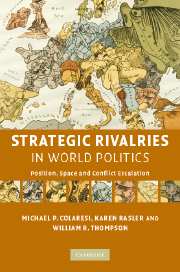Crossref Citations
This Book has been
cited by the following publications. This list is generated based on data provided by Crossref.
Manicom, James
and
O'Neil, Andrew
2009.
Sino-Japanese strategic relations: will rivalry lead to confrontation?.
Australian Journal of International Affairs,
Vol. 63,
Issue. 2,
p.
213.
Maoz, Zeev
2009.
Primed to Fight.
Conflict Management and Peace Science,
Vol. 26,
Issue. 5,
p.
411.
Dreyer, David R.
2010.
One Issue Leads to Another: Issue Spirals and the Sino-Vietnamese War.
Foreign Policy Analysis,
Vol. 6,
Issue. 4,
p.
297.
Dreyer, David R.
2010.
Issue Conflict Accumulation and the Dynamics of Strategic Rivalry1.
International Studies Quarterly,
Vol. 54,
Issue. 3,
p.
779.
Wiegand, Krista E
2011.
Militarized territorial disputes.
Journal of Peace Research,
Vol. 48,
Issue. 1,
p.
101.
McLaughlin Mitchell, Sara
and
Thies, Cameron G.
2011.
Issue Rivalries.
Conflict Management and Peace Science,
Vol. 28,
Issue. 3,
p.
230.
Florea, Adrian
2012.
Where Do We Go from Here? Conceptual, Theoretical, and Methodological Gaps in the Large-N Civil War Research Program1.
International Studies Review,
Vol. 14,
Issue. 1,
p.
78.
Maoz, Zeev
and
San-Akca, Belgin
2012.
Rivalry and State Support of Non-State Armed Groups (NAGs), 1946-20011.
International Studies Quarterly,
Vol. 56,
Issue. 4,
p.
720.
Findley, Michael G.
Piazza, James A.
and
Young, Joseph K.
2012.
Games Rivals Play: Terrorism in International Rivalries.
The Journal of Politics,
Vol. 74,
Issue. 1,
p.
235.
Rudkevich, Gennady
Travlos, Konstantinos
and
Diehl, Paul F.
2013.
Terminated or Just Interrupted? How the End of a Rivalry Plants the Seeds for Future Conflict.
Social Science Quarterly,
Vol. 94,
Issue. 1,
p.
158.
De Castro, Renato Cruz
2013.
China and Japan in maritime Southeast Asia: extending their geo-strategic rivalry by competing for friends.
Philippine Political Science Journal,
Vol. 34,
Issue. 2,
p.
150.
Carmichael, Cathie
2013.
Genocide, Risk and Resilience.
p.
131.
Wright, Thorin M.
and
Rider, Toby J.
2014.
Disputed territory, defensive alliances and conflict initiation.
Conflict Management and Peace Science,
Vol. 31,
Issue. 2,
p.
119.
Valeriano, Brandon
and
Powers, Matthew
2014.
Complex Interstate Rivals.
Foreign Policy Analysis,
p.
n/a.
Sample, Susan G.
2014.
From Territorial Claim to War: Timing, Causation, and the Steps-to-War.
International Interactions,
Vol. 40,
Issue. 2,
p.
270.
Diehl, Paul F.
and
Wright, Thorin M.
2016.
A Conditional Defense of the Dyadic Approach: Table 1..
International Studies Quarterly,
Vol. 60,
Issue. 2,
p.
363.
Diehl, Paul F.
2016.
Exploring Peace: Looking Beyond War and Negative Peace.
International Studies Quarterly,
Vol. 60,
Issue. 1,
p.
1.
Wright, Thorin M.
and
Diehl, Paul F.
2016.
Unpacking Territorial Disputes.
Journal of Conflict Resolution,
Vol. 60,
Issue. 4,
p.
645.
Mitchell, Sara McLaughlin
2017.
Dangerous bargains with the devil? Incorporating new approaches in peace science for the study of war.
Conflict Management and Peace Science,
Vol. 34,
Issue. 1,
p.
98.
Mitton, John Logan
2017.
Rivalry intervention in civil conflicts: Afghanistan (India–Pakistan), Angola (USSR–USA), and Lebanon (Israel–Syria).
Canadian Foreign Policy Journal,
Vol. 23,
Issue. 3,
p.
277.



